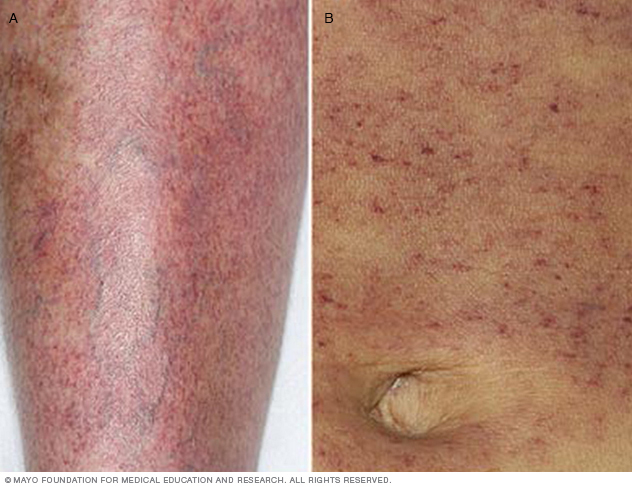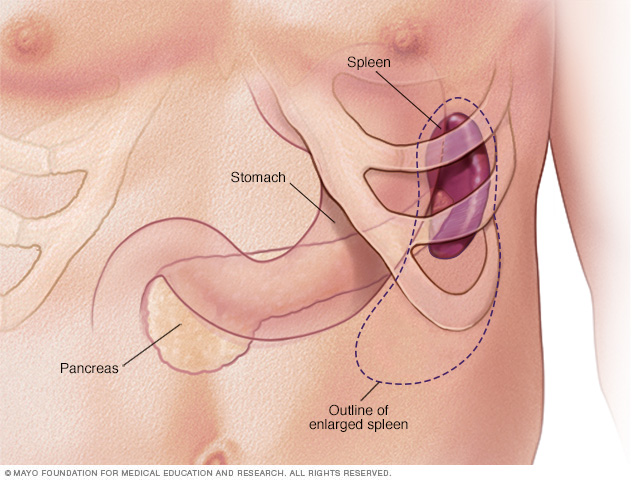Thrombocytopenia (low platelet count)
Overview
Thrombocytopenia is a condition in which you have a low blood platelet count. Platelets (thrombocytes) are colorless blood cells that help blood clot. Platelets stop bleeding by clumping and forming plugs in blood vessel injuries.
Thrombocytopenia might occur as a result of a bone marrow disorder such as leukemia or an immune system problem. Or it can be a side effect of taking certain medications. It affects both children and adults.
Thrombocytopenia can be mild and cause few signs or symptoms. In rare cases, the number of platelets can be so low that dangerous internal bleeding occurs. Treatment options are available.
Symptoms
Thrombocytopenia signs and symptoms may include:
- Easy or excessive bruising (purpura)
- Superficial bleeding into the skin that appears as a rash of pinpoint-sized reddish-purple spots (petechiae), usually on the lower legs
- Prolonged bleeding from cuts
- Bleeding from your gums or nose
- Blood in urine or stools
- Unusually heavy menstrual flows
- Fatigue
- Enlarged spleen
When to see a doctor
Make an appointment with your doctor if you have signs of thrombocytopenia that worry you.
Bleeding that won't stop is a medical emergency. Seek immediate help for bleeding that can't be controlled by the usual first-aid techniques, such as applying pressure to the area.

Bleeding into the skin looks like tiny reddish-purple spots, also known as petechiae. Petechiae might look like a rash. Here they appear on a leg (A) and on the stomach area (B).
Causes
Thrombocytopenia means you have fewer than 150,000 platelets per microliter of circulating blood. Because each platelet lives only about 10 days, your body normally renews your platelet supply continually by producing new platelets in your bone marrow.
Thrombocytopenia rarely is inherited; or it can be caused by a number of medications or conditions. Whatever the cause, circulating platelets are reduced by one or more of the following processes: trapping of platelets in the spleen, decreased platelet production or increased destruction of platelets.
Trapped platelets
The spleen is a small organ about the size of your fist situated just below your rib cage on the left side of your abdomen. Normally, your spleen works to fight infection and filter unwanted material from your blood. An enlarged spleen — which can be caused by a number of disorders — can harbor too many platelets, which decreases the number of platelets in circulation.
Decreased production of platelets
Platelets are produced in your bone marrow. Factors that can decrease platelet production include:
- Leukemia and other cancers
- Some types of anemia
- Viral infections, such as hepatitis C or HIV
- Chemotherapy drugs and radiation therapy
- Heavy alcohol consumption
Increased breakdown of platelets
Some conditions can cause your body to use up or destroy platelets faster than they're produced, leading to a shortage of platelets in your bloodstream. Examples of such conditions include:
- Pregnancy. Thrombocytopenia caused by pregnancy is usually mild and improves soon after childbirth.
- Immune thrombocytopenia. Autoimmune diseases, such as lupus and rheumatoid arthritis, cause this type. The body's immune system mistakenly attacks and destroys platelets. If the exact cause of this condition isn't known, it's called idiopathic thrombocytopenic purpura. This type more often affects children.
- Bacteria in the blood. Severe bacterial infections involving the blood (bacteremia) can destroy platelets.
- Thrombotic thrombocytopenic purpura. This is a rare condition that occurs when small blood clots suddenly form throughout your body, using up large numbers of platelets.
- Hemolytic uremic syndrome. This rare disorder causes a sharp drop in platelets, destruction of red blood cells and impairs kidney function.
- Medications. Certain medications can reduce the number of platelets in your blood. Sometimes a drug confuses the immune system and causes it to destroy platelets. Examples include heparin, quinine, sulfa-containing antibiotics and anticonvulsants.

The spleen is a small organ usually about the size of your fist. But a number of conditions, including liver disease and some cancers, can cause your spleen to become enlarged.
Complications
Dangerous internal bleeding can occur when your platelet count falls below 10,000 platelets per microliter. Though rare, severe thrombocytopenia can cause bleeding into the brain, which can be fatal.
Diagnosis
The following can be used to determine whether you have thrombocytopenia:
- Blood test. A complete blood count determines the number of blood cells, including platelets, in a sample of your blood.
- Physical exam, including a complete medical history. Your doctor will look for signs of bleeding under your skin and feel your abdomen to see if your spleen is enlarged. He or she will also ask you about illnesses you've had and the types of medications and supplements you've recently taken.
Your doctor might suggest other tests and procedures to determine the cause of your condition, depending on your signs and symptoms.
Treatment
Thrombocytopenia can last for days or years. People with mild thrombocytopenia might not need treatment. For people who do need treatment for thrombocytopenia, treatment depends on its cause and how severe it is.
If your thrombocytopenia is caused by an underlying condition or a medication, addressing that cause might cure it. For example, if you have heparin-induced thrombocytopenia, your doctor can prescribe a different blood-thinning drug.
Other treatments might involve:
- Blood or platelet transfusions. If your platelet level becomes too low, your doctor can replace lost blood with transfusions of packed red blood cells or platelets.
- Medications. If your condition is related to an immune system problem, your doctor might prescribe drugs to boost your platelet count. The first-choice drug might be a corticosteroid. If that doesn't work, stronger medications can be used to suppress your immune system.
- Surgery. If other treatments don't help, your doctor might recommend surgery to remove your spleen (splenectomy).
- Plasma exchange. Thrombotic thrombocytopenic purpura can result in a medical emergency requiring plasma exchange.
Lifestyle and home remedies
If you have thrombocytopenia, try to:
- Avoid activities that could cause injury. Ask your doctor which activities are safe for you. Contact sports, such as boxing, martial arts and football, carry a high risk of injury.
- Drink alcohol in moderation, if at all. Alcohol slows the production of platelets in your body. Ask your doctor whether it's OK for you to drink alcohol.
- Use caution with over-the-counter medications. Over-the-counter pain medications, such as aspirin and ibuprofen (Advil, Motrin IB, others) can prevent platelets from working properly.
Preparing for an appointment
Start by seeing your primary care doctor, who can manage most cases of thrombocytopenia. In certain situations, he or she might refer you to a specialist in blood diseases (hematologist).
Here's some information to help you get ready for your appointment.
What you can do
When you make the appointment, ask if there's anything you need to do in advance, such as restrict your diet.
Make a list of:
- Warning signs you've noticed, such as any unusual bruising or bleeding or any rashes, and when they began
- Key personal information, including recent illnesses or medical procedures such as a blood transfusion, major stresses or recent life changes
- All medications, vitamins and other supplements you take, including doses
- Questions to ask your doctor
Take along a family member or friend, if possible, to help you remember the information you receive.
For thrombocytopenia, questions to ask your doctor include:
- How many platelets do I have in my blood?
- Is my platelet count dangerously low?
- What is causing my thrombocytopenia?
- Do I need more tests?
- Is my condition likely temporary or chronic?
- What are my treatment options?
- What will happen if I do nothing?
- Are there any restrictions that I need to follow?
- Are there printed materials I can have? What websites do you recommend?
Last Updated Apr 19, 2022
© 2024 Mayo Foundation for Medical Education and Research (MFMER). All rights reserved. Terms of Use